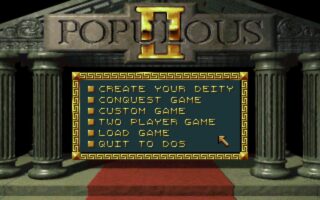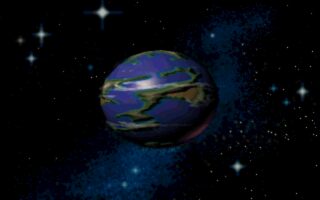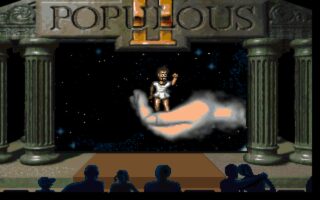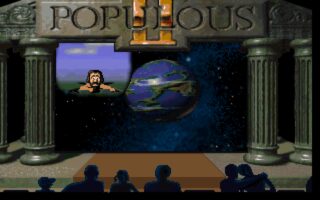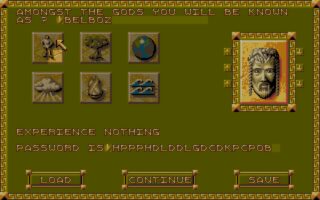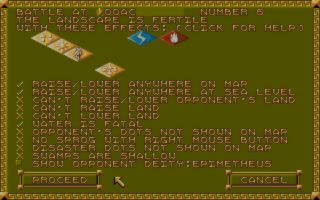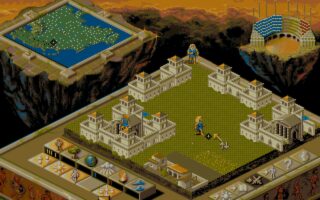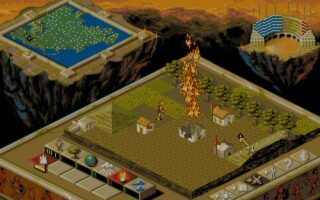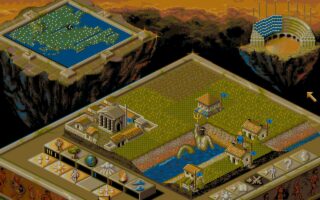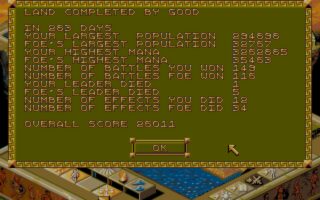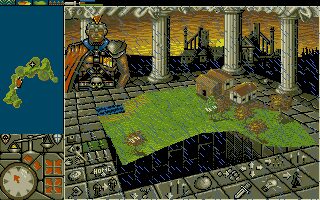Game Review
Populous II: Trials of the Olympian Gods is a sandbox “god” game developed by Bullfrog and published by Electronic Arts in 1991 for the Amiga.
It has since been ported to several other platforms including Atari ST, SNES, MAC, and Windows. This is the sequel to the original Populous also created by Bullfrog and published by EA.
Populous II takes place on a backdrop of Greek Mythology. You play as one of Zeus’ many mortal children. Because everyone knows Zeus doesn’t know how to keep it in his pants. Like many of his children, you’re angry at Zeus and your goal is to battle your way through all the gods and take him down. Battling across multiple maps, you will have to amass followers and become strong enough to defeat the gods. Much like the first one, you need to alter the landscape to make it more livable for your followers and allow them to build and multiply. Populous II allows you to use a larger array of god powers to kill the opposing god’s followers and destroy their cities. You can also endow one of your followers with the power of the gods and have them do your bidding.
During battles, once 75% of the map has been taken over by either side, mythological creatures will come out to join the fight. You’ll see things like the mighty Colossus and deadly Medusa. The arrival of these monsters signifies that it’s time to wrap things up because you can’t kill them. Populous II features 1000 maps, though particularly successful victories will allow you to skip over certain maps.
Just as successful as the first, Populous II won several awards and high scores. It’s definitely a game you can spend a lot of time on because it is not short on levels and things to do. If you want to feel like a god, try your hand at this.
 Review by: Tasha
Review by: Tasha
Published: 1 August 2018 2:30 am
Users Reviews
Populous 2, in its day, but when it was released, was a resounding success! Since we intend to make Zeus understand that he is his son and therefore that he has the right to sit in the circle of the divinities ... to prove it, we take on the role of a divinity who must bring his own civilization to the expansion. "The real strength of this fantastic game, it was precisely the special effects that the divinity performed on the territory, mainly the opponent's one.
In fact, each level was a challenge with another deity and her population. The divine effects were divided into categories. There was the category of fire ... that of water ... that of atmospheric elements ... that of earth and that on men ... For each category there were different spells ... almost all of them really deadly. .. Those belonging to the category of fire, included columns of fire, burning rains ... and volcanoes ... The magical effects of the water included powerful eddies in the water, to be hurled on the opposing coasts, or even the insidious "baptismal fonts. ", they were generated on the enemy territory forming numerous pools of water, if some enemy citizen fell into them, then that citizen passed to serve the opposing civilization! Up to the devastating tsunami waves ... In the atmospheric effects category, we can mention lightning, tornadoes and even hurricanes ... If the opponent was able to unleash tsunami waves together with hurricanes ... Basically it was the end !!!
To have the strength to activate such disasters on the enemy, the deity we personified had to receive a steady stream of ... mana, which in turn was directly proportionate to the devotion of the civilization entrusted to us. If our population was able to grow, founding numerous settlements, then that population was grateful to the divinity and honored it with prayer, this was the mechanism that assured us the strength to cause powerful spells. On the contrary, a population that struggled to find a place to settle, did not produce enough gratitude, and consequently no prayers, therefore no mana ... and therefore no divinatory energy was given to our divinity ... In order to favor the birth of the settlements we right-clicked on any other settlement and we could see that a citizen was leaving that settlement and setting out in search of flat land where a new settlement could be established. So our primary task was to provide our people with flat land, possibly near trees or, if we had the appropriate spell, to grow flowers on the land to be colonized.
However, it was not a question of being able to win only through these prodigious effects, on the contrary it was possible to implement a strategy that would encourage the construction of many settlements inhabited by warrior people. This type of population grew more slowly than the "normal" population, but had a much higher fighting capacity. Hence they were more ready to repel conventional attacks carried out by enemy troops.
The fundamental point was the so-called "papal crown".
It is a symbol that was suspended in the air, when a citizen came under this symbol, he becomes a leader. This is very important, because a leader can become a "hero" who symbolizes a certain category of prodigies. For example, if in a certain level we are given powers over fire, if you have a lot of mana, you can get to transform a leader into the hero "Achilles" ... the effects on the opposing population are lethal!
During the game, a figure in the shape of an amphitheater, informed us of the consistency of our population and also of the opponent. In fact, the stands of the amphitheater were filling up as the population grew, both on our part and on the opponent's side, if at a certain point we realized that we had an overwhelming superiority over the opponent, we could invoke " the Armageddon ". A kind of final battle where all the population present in that scenario and on the whole map, descended on the level of the frontal confrontation in a total manner. Obviously the population that exterminated the other was declared the winner.
Once we won a scenario, we were given a score based on the population reached and the total damage done to the enemy.
This score determined what improvements we could add to the divinity we were impersonating. Which spells we could focus on was our free choice.
I tell you immediately that the victory was obtained after having fought for a very long time and the undertaking was not at all easy ... So, no more chatter and ready to lead our people towards an ever more glorious future ...
One last thing ... unlike the ms dos version, the Amiga version, on the game command line, would not have the command to expand the game area. In order to obtain it, in the Amiga version, press the "enter" key. To switch back to the small screen view, just press the "enter" key again.
Uh! I forgot ... In the Amiga version, there would be a small problem ... When it is loading, the game allows us to start either with the classic version or with the "Challenge Games" version. Unfortunately, if we choose "Challenge Games" the game crashes with a specific message ... "Dos error 205 (object not found) on reading" credits-cg.exe ". From that moment, the game must be reset, and in the phase of loading, the "classic" version must be chosen. With this configuration, the game has no problems.
I am sorry for this inconvenience, because the Populous 2 add-on: "Challenge Games", I know it well, because I bought it at the time in the 90s. It was an addition to the original game of a new way to play. No longer the destruction of a rival force, but literally on the "survival" of a group of our citizens, who should escape a series of calamities ... For example, trying to rescue citizens who are about to be swallowed up by a tsunami ... or to escape a volcanic eruption, or even a raging storm. There were 500 such scenarios. So if that problem could be solved, it would be quite a hit.
 Review by: Maurizio Petta
Review by: Maurizio Petta
Published: 20 July 2022 5:51 pm

